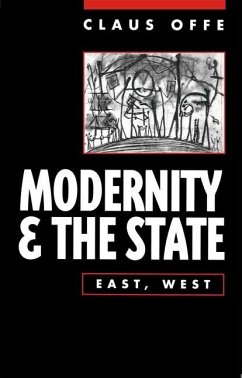
Coercion and Consent
Studies on the Modern State
Versandkostenfrei!
Versandfertig in über 4 Wochen
27,99 €
inkl. MwSt.

PAYBACK Punkte
14 °P sammeln!
The debate about the nature of modernity and postmodernity has been extensive. Yet, this debate has focused overwhelmingly on the cultural sphere. This volume, in contrast, examines the key institutional structures and processes of modernity. In particular, Coercion and Consent examines the form and character of capitalism, the dynamics of war, problems of late development, the nature of civil society, causes of the collapse of state socialism, the revival of nationalism and possibilities for democratization. The central thesis of the book is that modernity arrived well before most social theo...
The debate about the nature of modernity and postmodernity has been extensive. Yet, this debate has focused overwhelmingly on the cultural sphere. This volume, in contrast, examines the key institutional structures and processes of modernity. In particular, Coercion and Consent examines the form and character of capitalism, the dynamics of war, problems of late development, the nature of civil society, causes of the collapse of state socialism, the revival of nationalism and possibilities for democratization. The central thesis of the book is that modernity arrived well before most social theorists imagined, and it established structures of power and expectation that look set to remain with us far longer than the theorists of postmodernity claim. John Hall offers a fresh voice to the discussion about the prospects of modernity, combining historical insight with sustained political and social analysis.












